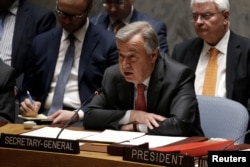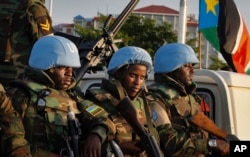The United States wants to cut $1 billion from the total United Nations peacekeeping budget for the year from July 1 to shave over 10 percent off Washington's share of the bill following calls by President Donald Trump for U.S. funding to be slashed.
The proposal by the largest U.N. contributor is an opening bid in negotiations by the 193-member General Assembly budget committee, which has to agree on funding for 13 peacekeeping missions and a logistics support office by the end of June.
Reuters reviewed a document compiling the peacekeeping budget proposals by states and regional groups.
The U.S. proposal of an annual budget of $6.99 billion was the lowest made - nearly $1 billion less than U.N. chief Antonio Guterres' proposal and almost $570 million less than the recommendation by the world body's budget advisory experts.
Under the U.S. proposal, Washington would have to pay $1.99 billion compared with $2.25 billion for the current year.
While Trump has described U.S. funding for the United Nations as "peanuts" compared to its "important work," he complains its share of the peacekeeping bill, currently 28.5 percent, is "unfair." In his 2018 budget proposal he requested Congress approve only $1.2 billion for U.N. peacekeeping.
This is $1 billion less than the U.S. peacekeeping bill for the 12 months to June 30, 2017, when the total peacekeeping budget was $7.9 billion. Washington currently owes $417 million for peacekeeping, U.N. officials said.
Ultimately the U.S. Congress sets the federal government budget and will decide how much money is made available for U.N. peacekeeping. Republicans, who control both houses, and Democrats have said they do not support drastic cuts proposed by Trump.
Under the U.S. proposal to the U.N. budget committee, the largest cuts would be made to some of the most expensive operations in Democratic Republic of Congo, Mali and Sudan's Darfur, according to the document seen by Reuters.
The 193 U.N. member states are working to negotiate a compromise by the end of the month between the U.S. proposal, at the low end of the scale, and the highest suggestion of $7.72 billion by the African Group, according to the document.
Trump also wants to enforce a 25 percent cap on the U.S. contribution to U.N. peacekeeping. The U.N. General Assembly is due to negotiate next year new levels of contributions by countries for 2019, 2020 and 2021.
The United States also pays 22 percent of the $5.4 billion U.N. core budget.
Guterres has pledged to make U.N. peacekeeping more efficient but has noted that the current budget to fund it is less than one half of 1 percent of global military spending.







